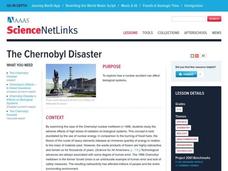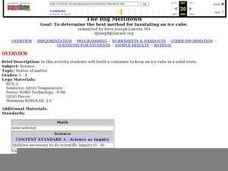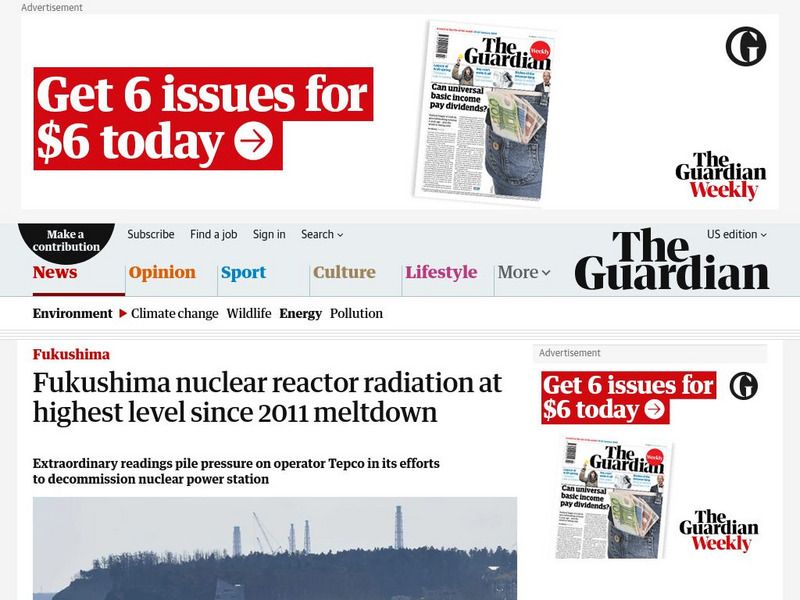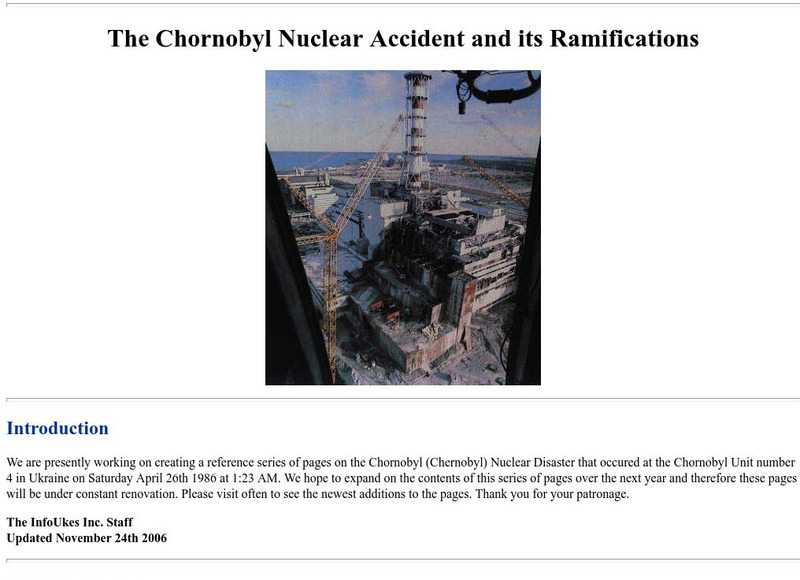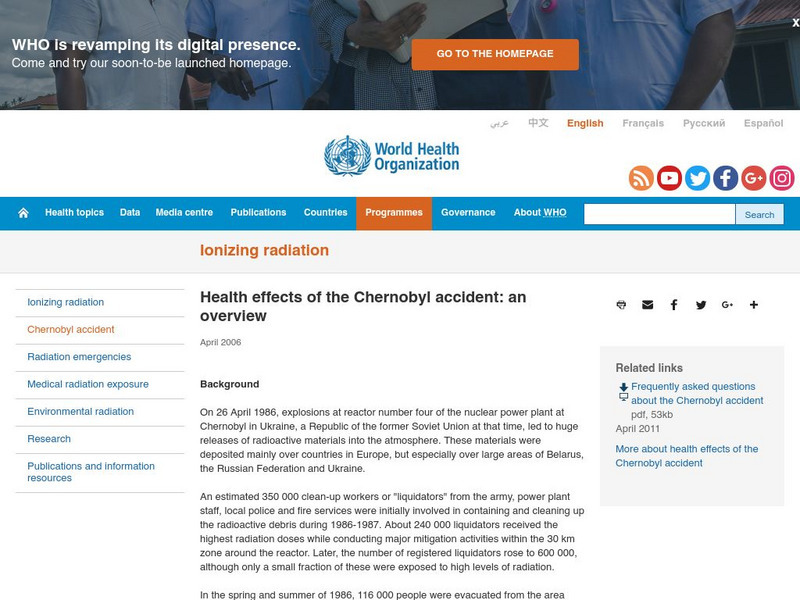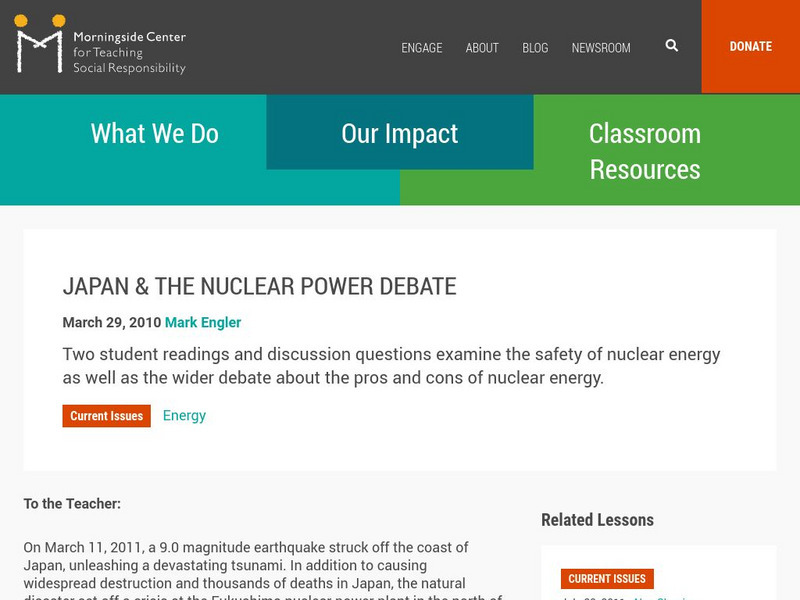Space Awareness
The Big Meltdown
Explore the world (our world) of melting ice caps. Why are these caps melting? What is the effect of melting ice caps? Dive into the ever-present issue of global warming with a resource that has learners looking at data and participating...
Curated OER
Global Meltdown
In this environmental science lesson, students study data and animation on global temperature increase to complete 8 short answer questions that follow.
Curated OER
THE CHERNOBYL DISASTER
Students explore how a nuclear accident can affect biological systems. They examine the case of the Chernobyl nuclear meltdown in 1986.
Curated OER
The Big Meltdown
Students work together to develop a container to keep an ice cube in a solid state. They identify the three stages of matter and test different materials for this experiment. They share their results with the class.
National Institute of Open Schooling
Radioactive Pollution
Radioactive pollutants can enter the body through ingestion, inhalation, absorption, or injection. The last lesson in a series of 36 introduces pupils to radioactive pollution. They study its sources, both natural and man-made, its...
Curated OER
Snow Sculpture
Third graders discuss and demonstrate how water has three forms: solid, liquid, and gas. They create a snow figure outdoors or freeze ice in molds and predict how long it will take for real solid water (snow sculpture or ice) to become...
Curated OER
Real Ice Ages Longer Than Movie Ice Ages
If your class's knowledge of the Ice Age is limited to animated movies, use this lesson plan to strengthen their knowledge. After sharing what they know about the Ice Age, young readers explore a news article seeking to dispel...
NOAA
Exploring Potential Human Impacts
Arctic sea ice reflects 80 percent of sunlight, striking it back into space; with sea ice melting, the world's oceans become warmer, which furthers global warming. These activities explore how humans are impacting ecosystems around the...
Curated OER
Radiation Crossword Puzzle
In this radiation instructional activity, students complete a crossword puzzle by figuring out the vocabulary terms associated with the 25 clues given.
PBS
Pbs Learning Media: Nuclear Reaction: Meltdown
What happens when a nuclear reactor overheats? This video segment adapted from FRONTLINE looks at the nuclear reactor meltdown at Chernobyl, the worst accident of its kind.
The Guardian
Guardian: Fukushima Nuclear Reactor Radiation at Highest Level Since Meltdown
The Japanese nuclear plant has to begin a lengthy decommissioning project. Concerns are growing over the radiation levels that have been rising since the plant's meltdown after the 2011 earthquake and tsunami.
PBS
Frontline: Three Mile Island: The Judge's Ruling
The background behind the nuclear meltdown at Three Mile Island, and information about the lawsuit filed many years later by those affected by the nuclear accident.
Other
World Nuclear Association: Three Mile Island Accident
Read about causes and effects of the meltdown that occurred at the Three Mile Island nuclear power plant in 1979. Learn about the layout of the plant and the changes that have been made so another meltdown will not occur.
PBS
Pbs: American Experience: Melt Down at Three Mile Island
Learn about what happened at Three Mile Island Nuclear Power Facility in March of 1979 with this PBS site. A teacher's guide is available.
Smithsonian Institution
National Museum of American History: Three Mile Island the Inside Story
This Web site was created to provide more information about the Three Mile Island nuclear power plant; about the course of the accident there; about the steps?extending over almost 15 years?through which the nature and extent of the...
Other
Chernobyl Children's Project International
The heart-breaking addendum to the Chernobyl accident is that thousands of children were and are still affected by the fallout. Here are the results of an international organization that strives to help these children.
PBS
Pbs Learning Media: Frontline: Chernobyl: What Really Happened?
This text excerpt from "Nuclear Renewal" by Richard Rhodes examines the causes of the Chernobyl accident. Reprinted on the online home of FRONTLINE, the series on PBS.
Wikimedia
Wikipedia: Three Mile Island Nuclear Generating Station
This article from Wikipedia describes the nuclear accident on Three Mile Island and the aftermath. Article provides links to related material.
Other
The Chernobyl Nuclear Accident and It's Ramifications
An excellent series of reference papers on the worst nuclear accident we have had. Maps and a photo gallery are also provided.
World Health Organization
World Health Organization: Health Effects of the Chernobyl Accident
A fact sheet on the Chernobyl accident: how many were exposed, where they were, the relocation efforts, amount of radiation received, and health problems associated with the accident.
TeachEngineering
Teach Engineering: Dangerous Air
By tracing the movement of radiation released during an accident at the Chernobyl nuclear power plant, students see how air pollution, like particulate matter, can become a global issue.
Other
Teaching Social Responsibility: Teachable Moment: Japan's Nuclear Power Debate
Readings and news articles provide information on the debate over nuclear energy. In particular, the questions being raised due to the crisis in Japan after the earthquake and tsunami in March, 2011.
Other popular searches
- Ice Age the Meltdown
- Meltdown Hoax
- Glacier Meltdown
- Great Meltdown
- Financial Meltdown
- Chernobyl Nuclear Meltdown In




